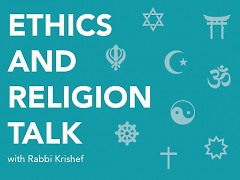Lauren G. wrote the Ethics and Religion Talk panel at [email protected] to ask:
“I'm curious about how celibacy plays into religion. I do know that Catholic priests, nuns, and monks practice it; but does it play any ‘official’ role in Protestantism? And I'm mostly curious about the other religions that are written about in the column.”
Rev. Ray Lanning, a retired minister of the Reformed Presbyterian Church of North America, responds:
“Presbyterians regard celibacy as God’s ‘gift of continency’ (I Corinthians 7:1-9), given to relatively few people, enabling them to persevere in single or unmarried estate. It is not something we can choose for ourselves, or accomplish in our own strength. We hold it to be a sin to entangle oneself with ‘vows of single life’ (Larger Catechism, Q. 130); so celibacy has no ‘official role’ in our churches. No one should be pressured by others to marry, or forbidden by others to marry.
“But it is a remarkable fact that Christianity owes its very existence to the lives and labors of three celibate men, John the Baptist, the Lord Jesus Christ, and the apostle Paul. Every pastor knows that celibate men and women make enormous contributions to the life and work of our churches, and they ought to be honored by their fellow Christians far more than is often the case.”
The Reverend Colleen Squires, minister at All Souls Community Church of West Michigan, a Unitarian Universalist Congregation, responds:
“Unitarian Universalist ministers are not required to practice celibacy. In fact our clergy are encouraged to live in healthy, loving relationships if they so desire. Our clergy can be single, partnered, married, separated, divorced, or widowed. We do not hold different standards for our ministers based on their sexual orientation. I have been with my wife for over 30 years, while my sexual orientation is different from most of my congregation I can completely relate to both the joys and challenges a long term marriage can bring to one’s life. Being in an intimate relationship helps to develop skills like conflict resolution, negotiation, compromise, and long term commitment.”
The Rev. Sandra Nikkel, head pastor of Conklin Reformed Church, responds:
“The view of celibacy in Protestantism is not so much related to an official role but to personal conviction and it varies depending on the person’s view of Scripture. Some Protestants view the Bible as a book of moral suggestions. I see the Bible as the only rule for faith and practice, my ultimate guide for what I believe and do. Therefore, I hold to belief that celibacy should be practiced by anyone who is not married.”
Fred Stella, the Pracharak (Outreach Minister) for the West Michigan Hindu Temple, responds:
“In Hinduism our teaching on celibacy is similar to, but not exactly in agreement with, the Catholic Church. As with most religious traditions, a life of celibacy is encouraged from the beginning of sexual maturity until marriage. Though this is not always observed in modern times it still continues to be the ideal. The only class of people that is expected to hold to lifelong restraint is that of the renunciant; one who chooses the life of a monk or nun (swami or swamini). When I say ‘lifelong’ I mean those who choose that calling at a young age. As with Catholics, a person may have a very rich married life and then choose to live as a monastic after they become widowed. It is understood that the vast majority of Hindus are destined to wed and beget. The scriptures teach that engagement with the world is a very noble path.
“There is also a teaching that married couples at a certain age may voluntarily return to celibacy and together pursue a life of study and meditation. This is decision that should be made together, and is in no way enforced by any religious hierarchy.
“Where we differ from Catholics is with our priests. They are encouraged to marry.”
My response:
I understand the question to be about a committed practice of intentional celibacy, deliberately forgoing dating, marriage, and sexual intimacy, which is not the same question as that of non-marital sexuality for those ultimately intending to marry or enter into similarly committed relationships. To that question, Judaism gives a strong negative response. Judaism believes that human beings were created to be in partnership with another. Granted, there are some people who simply have no interest in sex and sexual partnership. It is not a tremendous sin not to get married, although they would be giving up the opportunity to fulfill the commandment (mitzvah) to “be fruitful and multiply.” For those with a typical sex drive, denying it in order to remain celebate would be the very opposite of a holy act. It has never been meritorious or holy for anyone to deny themselves sex, whether clergy or lay people.
This column answers questions of Ethics and Religion by submitting them to a multi-faith panel of spiritual leaders in the Grand Rapids area. We’d love to hear about the ordinary ethical questions that come up on the course of your day as well as any questions of religion that you’ve wondered about. Tell us how you resolved an ethical dilemma and see how members of the Ethics and Religion Talk panel would have handled the same situation. Please send your questions to
[email protected].
The Rapidian, a program of the 501(c)3 nonprofit Community Media Center, relies on the community’s support to help cover the cost of training reporters and publishing content.
We need your help.
If each of our readers and content creators who values this community platform help support its creation and maintenance, The Rapidian can continue to educate and facilitate a conversation around issues for years to come.
Please support The Rapidian and make a contribution today.
